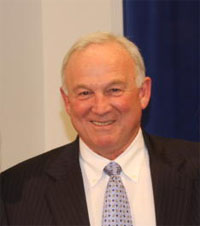Prop 8 opponents score hits against defense claims

Jerry Sanders (Photo credit: Bill Wilson)
SAN FRANCISCO — Testimony in the Proposition 8 trial Tuesday began with emotional testimony by San Diego’s Republican Mayor Jerry Sanders and ended with a clear hit against the claim that same-sex marriages will somehow do harm to straight marriages.
The former testimony was the more riveting, but the latter was the more important in terms of the legal case against the ban on recognition of same-sex marriage in California.
Attorney David Boies, one of the lead attorneys challenging California’s ban, promised last week that he would demonstrate how experts from the team defending Proposition 8 disagreed with the team’s key arguments. And today, he delivered.
Boies was questioning a pro-gay marriage expert—economist Lee Badgett—when he asked her to comment on a statement by defendant expert Douglas W. Allen concerning the decline in straight couples marrying in The Netherlands. Charles Cooper, the defense’s lead attorney, objected, noting that the defense had withdrawn Allen as a witness.
But federal Judge Vaughn Walker, who will decide the case, Perry v. Schwarzenegger, allowed the testimony.
What the defense expert had said—during his deposition in September—was that any trend downward in the number of straight couples marrying in The Netherlands since same-sex marriage became available there in 2001 could be attributed to a larger “secular trend” witnessed by most western countries. In fact, he said, there was “no doubt” about that.
That statement helps undermine the defendants’ claim that allowing same-sex couples to marry hurts the institution of marriage.
San Diego Mayor Jerry Sanders, another witness called by opponents of Proposition 8 Tuesday, said his lesbian daughter Lisa’s marriage to her same-sex partner had not weakened his marriage to his wife but made it stronger.
“It’s not harmed our marriage or anybody else’s in the world,” said Sanders. Lisa Sanders joined her father in the courtroom. During much of his testimony, Sanders acknowledged that he needed to look away from Lisa in order not to become teary, something he did a number of times, especially when talking about Lisa’s marriage. Lisa and her spouse traveled to Vermont to marry.
“It made me feel pretty bad that they had to go all the way across the country to get married,” said Sanders, “without family or friends.”
Defense attorney Brian Raum, on cross-examination, noted that Sanders had once supported civil unions as a reasonable alternative to marriage for same-sex couples. But Sanders was repeatedly emphatic that his previous views had been based in prejudice. They volleyed when Raum tried to suggest that Sanders’ prejudice had not been the same thing as animus.
“What do you mean animus?” asked Sanders.
“What does animus mean to you?” returned Raum.
“Animus means hatred or bigotry,” said Sanders.
“And can’t reasonable people disagree … and not necessarily be [basing their support of Proposition 8] on animus or ignorance?” asked Raum.
“It can be not based on animus,” said Sanders, “but it’s grounded in prejudice.”
Raum asked Sanders if he thought it was possible for someone to oppose Proposition 8 based on their religious views, without it being an expression of animus or hostility.
“It’s still grounded in prejudice,” said Sanders. “… Good faith beliefs do not negate the fact that one group is being treated entirely differently.”
The issue of whether Proposition 8 was grounded in animus or not is one of the important legal questions which Judge Walker must decide. The U.S. Supreme Court has ruled, in Romer v. Evans, that laws cannot disfavor certain minorities based on animus for those minorities. So Cooper and his team is trying to lay down a case for the idea that people could support Proposition 8 for reasons other than hatred of gay people.
The testimony by Badgett, a researcher for the Williams Institute in California and at the University of Massachusetts-Amherst, has attempted to establish that there is “very clear” evidence that same-sex couples see domestic partnerships as discriminatory designations. She also provided testimony indicating that many same-sex couples have children who could benefit from their parents’ marriage the same as do children of straight couples. Twenty-eight percent of the same-sex couples who have married in Massachusetts, she said, have children, and 93 percent of those couples reported feeling that their children “were happier and benefited from” the marriage.
These arguments help establish an important government interest in supporting equal marriage rights and, in so doing, contradict claims by proponents of Proposition 8 that there is some governmental need to ban same-sex marriages.
Cooper spent considerable time on cross-examination, attempting to discredit Badgett’s reported findings in a number of ways, including by suggesting that she is a “gay rights activist” and, thus, subjective in her studies.
And most interestingly, however, it was during Cooper’s cross-examination of Badgett that he made statements that seemed to indicate that he himself believes that marriage equality in California is inevitable. It came during his questioning Badgett’s claim that the state could benefit financially from allowing same-sex marriages because more couples would travel to California to get married.
“Dontcha think a lot [of those people] … will have already gotten married,” asked Cooper, “and will continue to get married between now and the time California will enable [them], through whatever means, to get married?”


Leave a Reply